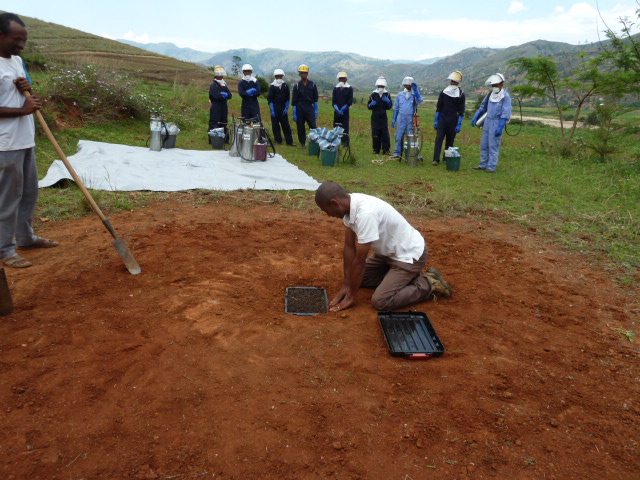
In Madagascar, an environmental compliance officer shows spray operators how to build a mobile soak pit before beginning to spray. Credit: Peter Chandonait, Abt Associates
The President’s Malaria Program’s (PMI’s) indoor residual spraying (IRS) programs undertake robust environmental compliance procedures to ensure operations have a minimal impact on the environment, from start to finish. During the end-of-day, clean-up process, the liquid waste that is generated from rinsing spray tanks and washing personal protective equipment that have come in contact with insecticide is removed using large, in-ground filters known as soak pits. In most spray areas, soak pits are permanent installations located in a central area that is accessible to spray teams at the end of their work day.
Mobile soak pits can be installed almost anywhere and consist of a large container with layers of stone, activated carbon, and sawdust that is placed in the ground. After spray operations and clean-up is complete, the mobile soak pit is dug up, removed, and is ready for use at the next location, while the hole for the soak pit is refilled to restore the site to its original condition. As a result, spray operations leave as close to a zero environmental footprint as possible in spray areas.
To increase efficiency and improve environmental safety, PMI piloted the use of mobile soak pits during the 2013–2014 IRS campaign in remote areas of Madagascar, where difficult roads require spray operators to access villages by foot. The mobile soak pits enabled spray operators to clean up immediately after completion of daily spraying, rather than having to travel to a central location. The mobile pits also improved control over potentially hazardous wastes because the wastes remained in the mobile soak pit, rather than in the ground.
The mobile soak pits also provided operational flexibility and reduced construction and labor costs as compared with building permanent soak pits. For the 2013–2014 IRS campaign in Madagascar, PMI used 36 mobile soak pits, compared to the 500 permanent soak pits built for the 2012–2013 IRS campaign. In fiscal year 2014, PMI expanded the mobile soak pit pilot to include Ethiopia, Senegal, and Mali. Mobile soak pits are being evaluated and, based on results, PMI may expand this innovation further in 2015.
